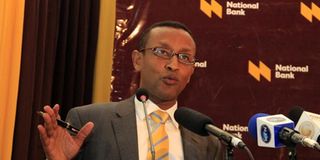Annulled Lamu title sparks fear bank could lose Sh1bn collateral

National Bank of Kenya boss Munir Ahmed. An official of a community organisation has been stopped from using assets of its 400,000 members to obtain a Sh7 billion loan from National Bank without their permission. FILE PHOTO | DIANA NGILA |
What you need to know:
- This revelation will have huge implications if investigations determine that the land was irregularly allocated.
- NBK has stabilised after years of political interference during the 24 years of Kanu rule that left it with millions in bad debts.
One of the 22 controversial Lamu land title deeds cancelled by President Uhuru Kenyatta last month is held by the state-owned National Bank of Kenya (NBK) as security for a loan of Sh1.065 billion, the Sunday Nation has established.
According to documents in our possession, Kaab Investments, one of the 22 companies being investigated by the police and the National Land Commission, charged its 6,268 acres with NBK on December 6, 2013.
The details were recorded in the Land ministry five days later.
On Saturday, NBK declined to discuss the matter citing confidentiality rules.
“We wish to note that we are bound by the confidentiality doctrines prescribed by the regulator; thus we are not in a position to disclose any details of our customers to any third party”, said NBK’s public relations officer Rebecca Gikuru in response to our enquiries.
This revelation will have huge implications if investigations determine that the land was irregularly allocated.
On Friday, Sunday Nation learnt that land fraud and banking fraud police officers visited NBK offices and National Social Security Fund offices as they wrapped up investigations that resulted in the cancellation of title deeds owned by firms allegedly irregularly allocated 500,000 acres of land in Lamu County.
The NSSF controls 48 per cent of shares in NBK while the government has 22 per cent. The rest of the shares are owned by the public.
MAY BE FRONTS
According to documents released by State House four weeks ago, Kaab Investments, whose registration number is C.145956, has four directors who last filed their returns this year.
The four are Zein Mohamed Ahmed (32,400 shares) Aweys Ahmed Mohamed (21,600 shares), James Mwangi Muturi (12,000 shares) and Balwinder Kaur Sagoo (54,000 shares).
But NLC and the police believe registered directors of some of the 22 companies under investigation may be mere fronts.
On Saturday, NBK board member Mr Francis Atwoli, who is also the Cotu secretary-general, assured workers that NSSF money was secure.
He noted that apart from the title deed, the company had other securities, which he did not want to divulge. He instead referred us to the bank’s CEO Munir Ahmed.
“Besides the land, they had separate security. If you talk to the CEO, he will tell you. The NSSF money is secure. NSSF and government monies are safe,” said Mr Atwoli. We could not reach Mr Munir for comment.
National Treasury Secretary Henry Rotich, whose representative sits on the NBK board, said that although he was not aware of the particular transaction, the bank must have done its due diligence and “by now should have checked whether the security is realisable and if it is not, the Central Bank, which is the regulator, must have offered guidance on security”.
Mr Rotich said he would seek more information from his representative on the board.
“Now that you have raised the issue, I will find out about this transaction. There is a credit policy in banks, which CBK enforces. Apart from the land there must be other securities like buildings, log books and other ways to cover themselves,” said Mr Rotich.
KEENLY MONITORING
We were unable to get an official comment from the Central Bank of Kenya (CBK), but a senior official who declined to be named because he is not authorised to speak to the media conceded that the regulator was keenly monitoring banks that issue loans with Lamu lands as security.
“It is true CBK is aware of this particular transaction. All banks that took titles are being monitored closely by CBK. The title deed is a just fallback. The bank takes other securities and checks company profiles, business proposals and cash flows. CBK is keenly monitoring the dynamics and there are many banks other banks in this situation,” he said.
NBK has stabilised after years of political interference during the 24 years of Kanu rule that left it with millions in bad debts.
On Friday it was announced that NBK’s half-year profit to June 2014 rose by 17 per cent to Sh776.3 million, attributed to increased transaction income and lending. The bank’s loan book doubled to Sh54.7 billion from Sh27.5 billion last year.
“We are pleased with these strong first-half results which are as a result of the operational improvements that we have made across the business,” the bank’s chief executive said.




